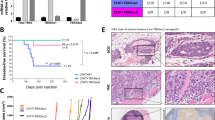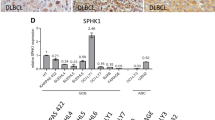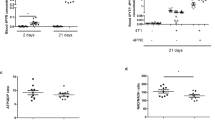Abstract
Tumour angiogenesis is a complex multistep process regulated by a number of angiogenic factors. One such factor, platelet-derived endothelial cell growth factor has recently been shown to be thymidine phosphorylase (TP). TP catalyses the reversible phosphorylation of thymidine to deoxyribose-1-phosphate and thymine. Although known to be generally elevated in tumours, the expression of this enzyme in breast carcinomas is unknown. Therefore, we used ribonuclease protection assays and immunohistochemistry to examine the expression of TP in 240 primary breast carcinomas. Nuclear and/or cytoplasmic TP expression was observed in the neoplastic tumour epithelium in 53% of tumours. Immunoreactivity was also often present in the stromal, inflammatory and endothelial cell elements. Although endothelial cell staining was usually focal, immunoreactivity was observed in 61% of tumours and was prominent at the tumour periphery, an area where tumour angiogenesis is most active. Tumour cell TP expression was significantly inversely correlated with grade (P = 0.05) and size (P = 0.003) but no association was observed with other tumour variables. These findings suggest that TP is important for remodelling the existing vasculature early in tumour development, consistent with its chemotactic non-mitogenic properties, and that additional angiogenic factors are more important for other angiogenic processes like endothelial cell proliferation. Relapse-free survival was higher in node-positive patients with elevated TP (P = 0.05) but not in other patient groups. This might be due to the potentiation of chemotherapeutic agents like methotrexate by TP. Therefore, this enzyme might be a prediction marker for response to chemotherapy.
This is a preview of subscription content, access via your institution
Access options
Subscribe to this journal
Receive 24 print issues and online access
$259.00 per year
only $10.79 per issue
Buy this article
- Purchase on Springer Link
- Instant access to full article PDF
Prices may be subject to local taxes which are calculated during checkout
Similar content being viewed by others
Author information
Authors and Affiliations
Rights and permissions
About this article
Cite this article
Fox, S., Westwood, M., Moghaddam, A. et al. The angiogenic factor platelet-derived endothelial cell growth factor/thymidine phosphorylase is up-regulated in breast cancer epithelium and endothelium. Br J Cancer 73, 275–280 (1996). https://doi.org/10.1038/bjc.1996.49
Issue Date:
DOI: https://doi.org/10.1038/bjc.1996.49
This article is cited by
-
Suppression of thymidine phosphorylase expression by promoter methylation in human cancer cells lacking enzyme activity
Cancer Chemotherapy and Pharmacology (2008)
-
Breast tumour angiogenesis
Breast Cancer Research (2007)
-
Intra-tumoural microvessel density in human solid tumours
British Journal of Cancer (2002)



